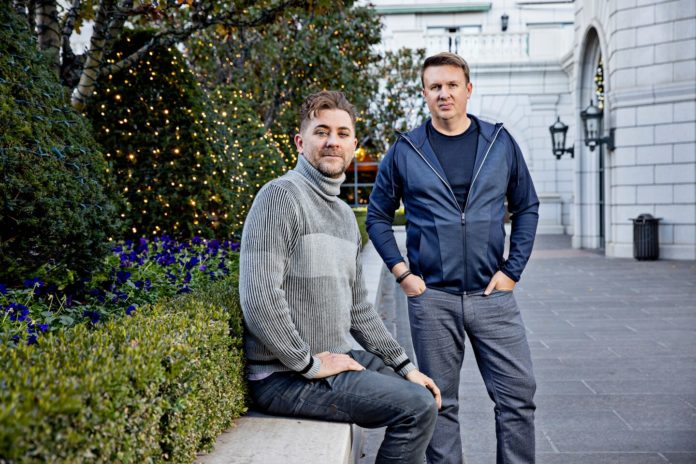
Oaks is next in line to lead the Church of Jesus Christ of Latter-day Saints and the world’s 16.8 million believers commonly known as Mormons. In his remarks at the University of Virginia, he hailed the virtues of religious freedom and the importance of LGBTQ nondiscrimination laws like the trailblazing one LDS leaders, lawmakers and LGBTQ activists worked to pass in 2015. Known as the “Utah compromise,” it bans discrimination against LGBTQ people in housing and employment while carving out exceptions for religious reasons.
“I deeply regret that these two groups have been drawn into conflict with one another,” Oaks said of advocates for religious liberty and LGBTQ rights.
To Williams’s amazement, Oaks then went on to quote Williams — a longtime activist who in 2009 led kiss-in rallies at the major temple in Salt Lake City and in 2014 was jailed after a sit-in at the state capitol — in a positive way. Despite both having worked on the compromise, the two have never met. (An LDS spokesperson said Oaks was not available for comment.)
LDS leaders and elected officials in Utah see the state as a role model for balancing what seems to many like competing rights in a deeply divided country. So far, Utah is the only state that has such a law on its books, and efforts to replicate it on a national level have so far failed.
Many supporters of LGBTQ rights are less enthusiastic. They cite glaring gaps in the state’s protections for LGBTQ people and argue that religious freedom protections, which were integral in securing conservative support for the compromise, were already strong in the state. For example, Brigham Young University prohibits LGBTQ students from dating and can deny housing to same-sex couples.
Williams still believes in engaging with lawmakers and Mormon leaders as he did six years ago. But he has a new source of potential leverage: the state’s tech industry. While start-ups were already springing up between Salt Lake and Provo before the compromise, observers credit the law — and the absence of measures such as a ban on gender-affirming health care or bathroom bills — with helping Utah stay competitive in the fight for talent. And now, with newly built fortunes, some tech entrepreneurs want to counter the influence of the LDS Church on social issues.
Upon reaching a penthouse suite, Williams was greeted by Jeff T. Green, who founded the online advertising company called the Trade Desk. Green is one of the wealthiest Mormons in the country with a net worth of about $5.7 billion. He had been skeptical the compromise had changed the state’s culture and had agreed to meet Williams to hear his group’s plans to advance LGBTQ rights.
During a two hour-conversation, they traded stories from their Mormon missionary days. Green, who now lives in California, explained that he was preparing to leave the church soon. And he wanted to know: What could Equality Utah do with more money?
Common ground
Since 2015, the state has taken other LGBTQ-friendly steps. In 2017, Utah overturned its “No Promo Homo” law, which prohibited discussion of LGBTQ issues in classrooms. In 2020, the state banned conversion therapy. And this year, the Mormon governor recognized Pride Month. A queer bookstore recently opened within walking distance to the LDS temple in Salt Lake City, and at least twice a month in Provo, Utahns can attend a drag show.
The compromise was also a recognition of changes that were already happening in Utah, now the nation’s fastest growing state. The year the compromise passed, Gallup reported Salt Lake City was home to more people who identify as LGBTQ per capita than New York City or Los Angeles. The following year, Salt Lake elected its first openly gay mayor, and the majority of its city council is now LGBTQ.
While LGBTQ advocates often view the enormous influence of the LDS church as an obstacle, some observers say it can be an advantage, too. Mormons make up about 86 percent of the state legislature, according to the Salt Lake City Tribune, while about 60 percent of Utahns are Mormon, according to the latest figures available from the LDS Church. Once Mormon leaders and lawmakers got behind anti-discrimination protections for LGBTQ people, they were able to get them through a Republican-controlled legislature, a rare step, according to Lambda Legal, a nonprofit group that tracks LGBTQ rights legislation.
How much further are they willing to go? LGBTQ rights advocates want the state to ban discrimination against LGBTQ people in public accommodations. For example, a Mormon cake baker can legally decline to provide services for a same-sex wedding. But some who helped craft the 2015 compromise feel they went far enough.
State Senate president J. Stuart Adams played a key role in the passage of the legislation. On a Friday in November at the state capitol, Adams, who is LDS, said his support for the law was inspired by a biblical passage where Jesus spoke about the importance of loving one’s neighbor as oneself.
“I realized I needed to live my religion rather than protect my religion,” Adams said. “Rising tide lifts all ships, and you find a way to protect everybody’s rights, you find your rights are protected with others.”
He said he understands not everyone is satisfied with the result, but how it came to be is still significant. Adams says he has Williams on his cellphone’s speed dial. When asked about new protections for public accommodations, he responded that Utah already has a culture of nondiscrimination, fostered in part by the compromise. In the six years since the law passed, no one has filed any complaints under the law for housing or employment discrimination, he said.
Many Utahns expect the issue of banning transgender girls and women from competing in girls’ and women’s sports will come up during the next legislative session. If it does, Adams says he will rely on the same strategy that produced the compromise: “One of the objectives is to be able to have a fair competition and not be discriminatory.”
Silicon Valley values
For Derek Kitchen, a Democratic state senator, it would be a step backward if the legislature even considered an anti-transgender bill. Kitchen, who co-owns a Lebanese restaurant where he holds a monthly queer poetry night, sued the state of Utah in 2015 in a case that legalized same-sex marriage there. He is proud of where Utah has come but wants to see Mormon legislators go even further and pass more anti-discrimination protections.
“If we’re so proud of the Utah compromise,” Kitchen said, “maybe we should flex that muscle once again.”
He has a vocal and sympathetic audience in “Silicon Slopes,” the nickname for the start-up-rich area between Provo and Salt Lake City. Many of the tech entrepreneurs are Mormon and attended BYU. Some have been influenced by Silicon Valley’s more libertarian culture and are sending money to a recently launched tech political action committee that will attempt to offer more progressive views on social views than the LDS Church in state politics.
“Despite the fact that the church is making more efforts on LGBTQ identities, it’s not enough for tech culture, which doesn’t have tolerance for discrimination of any kind,” said Taylor Petrey, a religion professor at Kalamazoo College who has written a book on Mormonism and LGBTQ issues. “[These tech leaders] want to assimilate into broader America, and this isn’t the issue they want to be identified with.”
Josh James, CEO of the software company Domo, is among the tech industry leaders railing against anti-transgender legislation and liquor laws. He and Apple CEO Tim Cook have donated to Encircle, a drop-in center for LGBTQ youth located across the street from a LDS temple in Provo.
James has also put up LGBTQ inclusive billboards and donated more than $1 million to related causes. James, a Mormon, said in an interview that he hopes the LDS Church changes its doctrine on LGBTQ people. The church does not recognize same-sex marriage and says marriage “between a man and a woman was instituted by God and is central to His plan for His children and for the well-being of society.”
“Mormons have been different for a long time,” James said. “There’s a recognition you need to accept other people who are different.”
The limits of compromise
Some of the push to go beyond the Utah compromise has grown out of disappointment with what the legislation has been able to accomplish for Mormons who are gay, several people inside the LDS Church said.
Students at BYU in Provo say the school is a microcosm of the contradictions that many LGBTQ Mormons in Utah experience.
A lot has changed at the school where decades earlier, “university approved” electroshock therapies were performed on gay students, according to the book “Gay Rights and the Mormon Church.” BYU eventually ended the practice, and in 2016, leaders denounced “any therapy that subjects an individual to abusive practices.”
In November, a group of about 80 staff and students met for a workshop on how to support LGBTQ students and students of color where people can ask questions, such as what does the word “genderqueer” means.
For Calvin Burke, though, the treatment of LGBTQ students has pushed him out of BYU entirely. The senior English major is planning to transfer next semester after years of difficult interactions.
When Burke came out at BYU, his roommate moved out while Burke was in class. A professor encouraged him to go to conversion therapy. The Utah compromise did not broaden the legal scope to protect LGBTQ employees in a place like BYU. Burke has worked in the cafeteria and as a carpet cleaner, and his employment could have also been in jeopardy if he had chosen to be in a relationship.
The tipping point for Burke came this year when a popular professor on Twitter called him a term from the Book of Mormon that is associated with the anti-Christ. The professor apologized, but Burke received public death threats and other attacks from the DezNat social media movement, which includes the alt-right. The school did not address the issue publicly.
“While this issue was addressed internally, BYU does not discuss disciplinary matters publicly,” it said in a statement.
“I fear for a lot of the students that are still at BYU that don’t have the support or the ability to find a different way,” Burke said. “I made the mistake of believing BYU could be safer.”
BYU said in response to Burke’s experience: “We are deeply concerned about the safety and welfare of our students. Students not only have access to our university police and our student counseling center, but we also have an Office of Student Success and Inclusion that offers support for student concerns and needs.”
Gay tithing
The sun was setting behind the mountains as Green went into his plans to submit his formal resignation from the LDS Church on Dec. 23, the birthday of Mormonism’s founder and an important day for the faith. He cited his frustrations with church leadership, especially over LGBTQ issues. Also resigning are his brother, an executive at Amazon; a cousin, a vice president at U.S. Bank; his sister, as well as several of their children.
Green and his siblings grew up in a conservative Mormon family of five children in Salt Lake, where he remembers standing in line for government assistance with his mother.
His journey away from the church began over a decade ago when Mormons raised millions of dollars for Proposition 8, a 2008 ballot proposition that once banned same-sex marriage in California. The LDS Church faced nationwide backlash, including from its own members. Around that time, Green had been doing his own research into Mormonism and concluded it had been on the wrong side of history on issues like women’s rights, civil rights and polygamy. Now Green, who lives in California and returns to his birthplace of Utah to ski, spends his Sundays studying philanthropy instead of attending services.
Before he met with Williams, Green said he was not sure the compromise was evidence the LDS Church has evolved enough. But he saw Oaks’s speech the night before as major progress from LDS leaders.
“I had my doubts. Is it really effective to try diplomacy with the church?” Green said.
“I see progress as a windy, curvy road. It’s never a straight line,” Williams replied. “I always celebrate the wins when we can.”
“The Mormon leadership is older than ever, and change in the world happens faster than ever,” Green said. (The LDS Church is led by a 97-year-old prophet, and his eventual successors are 89 and 88.)
Mormons are expected to give one-tenth of their income to the LDS Church as a tithe, and Williams said that whenever the church does something that upsets the LGBTQ community, Equality Utah receives donations that he calls “gay tithing.” The latest wave of donations came in August after one of the 12 Mormon apostles, Jeffery R. Holland, gave a speech at BYU where he urged “musket fire” on issues including “defending marriage as the union of a man and a woman.”
“We’re happy to take your tithing,” Williams told Green.
At the end of the meeting, the billionaire was still unsure exactly how much he was going to give to Equality Utah. (He would later donate $600,000, the second largest one-time donation the group has ever received). But he was won over by Williams’s diplomatic approach.
“I know there’s an attitude that we had this great Utah compromise and somehow we make it work, but we haven’t made it work yet,” Green said. “We can. We’ll get there.”
correction
An earlier version of this article misstated the amount of money donated by Josh James to LGBTQ causes. James has given more than $1 million. The article has been corrected.








